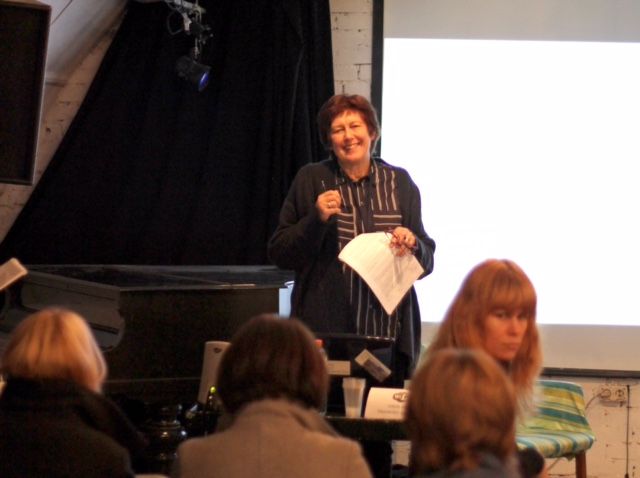Creative Labour Revisited: From Middle-Earth to Voronezh
In October, the international seminar ‘Creative Labour Revisited: Cultural Production in Distinct Institutional Environments’ took place at the Experimental Sound Museum in St. Petersburg. The event was supported by the HSE campus in St. Petersburg and the Centre for German and European Studies. The seminar was initiated by Margarita Kuleva, lecturer at HSE’s Department of Sociology in St. Petersburg, and attracted Russian scholars, including HSE researchers and international academics.
Over the last 20 years, a number of studies have been devoted to creative professionals, such as artists, designers, IT-specialists and journalists. These studies indicate a level of risk and inequality behind the bohemian charm, earlier promoted by the ideology of the creative class. The central concept of cultural (creative) labour studies would be precariousness - a fickle, unstable employment without many social guarantees. However, these studies have mainly been focused on Great Britain and West European countries. In Russia, on the contrary, despite major media attention on the development of creative industries, the working environment of creative professionals still remains in the shadows.
Over two days, seminar participants discussed British cultural policy, the gender dimension of creative labour, the specifics of the film industry in New Zealand and the ‘Hobbit Law’, and the working conditions of specialists in Russian cultural institutions, both in the country’s capital cities and beyond. Furthermore, a decision was made to publish the seminar proceedings in English.
Several of the seminar participants shared their impressions of the event.

Bridget Conor, King's College London
— What do you think about the event and your trip to St. Petersburg?
— I’m deeply impressed with everything that took place at the seminar. There was a wide range of topics, industry cases from such big Russian cities as Moscow and St. Petersburg, as well as small local museums – this is all very interesting. I also was thrilled to see some detailed descriptions of how creative labour in Russia is organized and practiced. I enjoyed participating in this event. This is my first time not only in St. Petersburg, but in Russia, and you know, I like it a lot and would definitely like to return.
— What key differences can you see in the organization of employment for creative professionals and the organization of creative work in Russia and Great Britain?
— Thanks to the information I got during the two days of the seminar, I now have a great opportunity to compare Russian cases and practices to those I am familiar with as a researcher in Britain. In fact, I can see more similarities than differences. The working conditions are very similar, such as freelance employment, short-term contracts and instability. This means that the problems are also very similar. I believe that the differences in how the creative industries are organized can be explained owing to specific cultural differences and the individual characteristics of the two countries’ political systems.
— Did you find out about any new research thanks to this seminar?
— I definitely have! I feel very inspired and I have a lot of fresh thoughts. One of the topics that I would like to look at is research on collaborative structures and cooperation in creative work.

Stephanie Taylor, The Open University
— Stephanie, what part of the seminar was the most memorable for you? What impressions do you have of your first trip to Russia?
— I’m very happy to be here. The event turned out to be incredibly interesting and productive. The papers presented at the seminar have helped us to draw parallels between the specifics of creative labour in various cities and countries, both in an academic and non-academic context. Speaking of my trip to Russia, I would like to spend more time here than I can do now. And St. Petersburg reminds me partly of Scandinavian cities, and also of British ones. In some parts, it looks like some districts of London or the streets of Glasgow. St. Petersburg seems to be a very youth-oriented city, full of opportunities.
— Do you consider your work to be creative labour?
— Yes, academic work is one of the types of creative labour, and the papers I write and publish are my creative product. The creative industry is a very atypical sphere. I’m attracted by its energy and a lot of the new ideas created by young people employed in creative industries. However, I’m definitely more interested in critical evaluation of creative labour and studying its status in society, as well as political and economic support for creative workers offered by state institutions. It’s necessary to create new educational programmes in order to professionalize this new sphere and stabilize career trajectories.
— What are the main differences between the creative industries in Russia and Great Britain?
— This is a major discussion. I would outline several differences. First, the market conditions are different in certain spheres. For example, it’s much easier for fashion industries to develop in Russia, since, in Britain, this is a very small and more closed market. The creative system in Russia also has a more complex structure, while in the UK, one of the key factors in this sphere is immigration. In addition, creative industries are always related to inequality. In Britain, race is an important issue, while we can’t comment on this for sure in regards to Russia. I listened to many presentations by my colleagues at the seminar which confirmed this to me once again.
Prepared by Anastasia Menshikova, Third-Year Sociology Student
Photos by Iolanta Skavidis
Margarita Kuleva